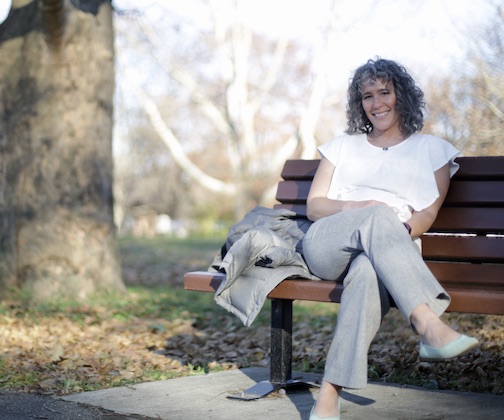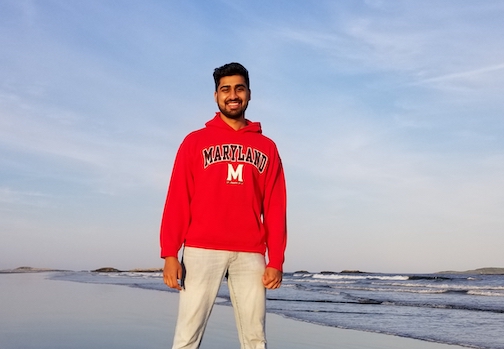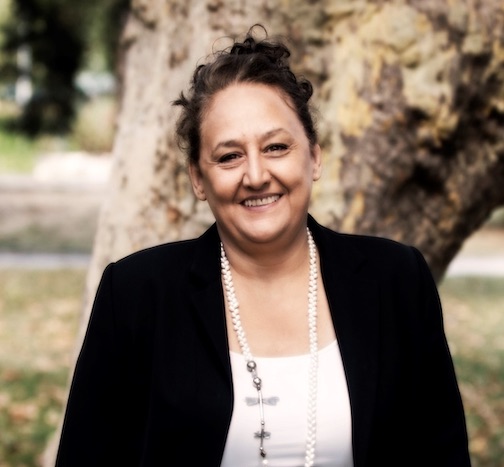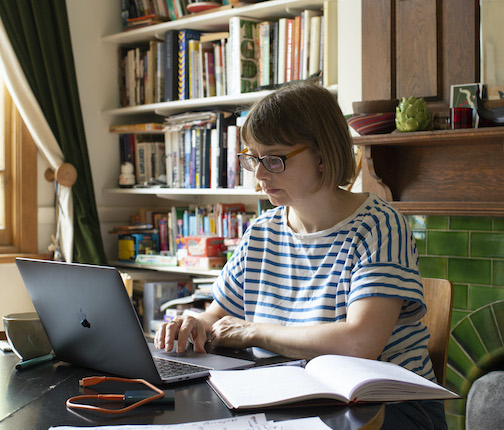Tell us about your background and what got you interested in your work?
I originally wanted to be an illustrator, however a combination of lack of confidence and family circumstances, made me turn down a long dreamed of place at art college. Instead I studied History of Art and did my own creative pursuits. The arts have always been massively important to me – books, music, films, visual art and poetry have provided a real life-line during difficult times, as well as being a source of joy and inspiration and a means of connecting with others. After graduating I did some voluntary work in a mental health day centre, running art classes and a monthly film show. Much to my surprise, I found that I was quite good at working with people (I had always been very shy) and really enjoyed it. During a one-off visit to a local job centre, I saw an advert for an ‘Arts & Education Officer’ and really because I liked the sound of the job title, applied and got the job. The role involved helping to organise and facilitate arts and creative activities in care homes and sheltered schemes for older people and mental health schemes for people of all ages. The organisation, Central & Cecil was the first housing provider in the UK, as far as I am aware of, to have a permanent paid for arts service for its residents. I worked there for over 20 years, going on to manage the service, working very closely with residents and care staff as well as some amazing partners including Magic Me, Green Candle Dance, The Royal Opera House and The Festival Hall. I learned so much during this time and saw first-hand the benefits of engaging with the arts for older people and specifically those with dementia. It was also amazingly rewarding, interesting and enjoyable.
Tell us about the resources and different art forms that you facilitate, and the neighborhood/different locations you work in.
I now manage a project called Arts in Care Homes, for an organisation called NAPA who promote the importance of meaningful activities for older people in care settings and the need for training and support for care staff. The project is partly funded by The Baring Foundation, who have been massively influential in terms of supporting arts and older people related projects in the UK. Arts in Care Homes role is to champion the importance of arts activities for residents and staff. Our website is a user friendly resource for anyone interested in organising arts activities for older people. The National Day of Arts in Care Homes takes place on 24 September and this year’s theme is Creative Communities. Due to a lot of interest from the rest of the UK and other countries we are hoping that people outside England will get involved and share stories and organise events on the day. We are interested in all art forms, from large scale care home choir projects to small everyday creative activities such as crafts and flower arranging and everything in between including poetry, digital arts, animation, drama, creative writing. I mainly work from home (even before Covid-19) and the project is managed online but I also run projects in care settings.
How has your routine changed since the pandemic?
My children have been at home along with my husband and juggling school work, housework, ‘work’ work and family life, has been challenging. My work has actually been very busy. I have been asked to do three additional related projects and am currently promoting the upcoming National Day of Arts in Care Homes and trying to get lots of people on board. One Arts in Care Homes initiative that has really taken off has been Only Connect Pen Pals linking up care homes with volunteer pen pals to exchange messages of support, art and poems by email. We have had hundreds of people sign up to write to care home residents and staff. The project seems to have tapped into a very strong desire in people to get involved, connect and help older people and care staff in some way at this most difficult time. Lots of young people have signed up, citing feelings of isolation and an interest in linking with the older generations amongst their reasons. People want to connect and build feelings of community at this time and art has an important role to play.
How does trust play a role in your daily routine, especially in the current Covid atmosphere?
I trust the people I work with and they trust me. I have an amazing team at NAPA who support me and trust me to get on with my job. There are also some amazing people working in the care sector who I go to for feedback and to check our Arts in Care Homes project is useful and on the right track for people living and working in care settings. In terms of doing arts projects with older people, I think it is important to take your time, be really present in the situation and listen. The arts can offer such a powerful means of communicating, often without words, which can be especially relevant when working with people living with dementia. I have learned to trust in the artistic process, despite still always being apprehensive before doing an activity or project in a care setting, asking will it work and is this the right approach? Projects always need to be user led if possible and responsive to participants’ needs and interests. When the exchange works, it can seem like magic – the arts really can reach parts other things can’t reach. After many years working in this field, combined with my own personal life experiences, I have learned to trust in the process.
What do you wish the public knew about what you experience, working in care homes, when it comes to creativity and emotional health?
I wish the public knew how very enjoyable working in care settings can be. Talking to older people and doing arts activities is so rewarding. I have learned so much about life and myself from working in this field and feel very lucky. I wish the public knew the amazing things going on in many care homes and the care and time taken to develop really meaningful person centred activities and support for individual residents. We are not there yet, and there is much work to be done in terms of providing specialist dementia-care creative activities and person-centred care for all residents but there are lots of people working hard and trying their best to improve things. I wish people could see how a simple piece of music, a poem, colour, smells and texture can almost magically evoke memories, give pleasure and energise and invigorate older people including those with dementia. I wish it had not taken a global pandemic for people to remember and value care staff and older people who contribute so much to our society …
What is the best part of your day? The hardest?
I don’t work so much in care homes anymore as my current role is more about disseminating information, connecting people and encouraging people to share stories about how they use the arts with older people. However, before Covid-19, doing a hands on project or visiting projects led by other people, was definitely one of the best aspects of my job. Now I love receiving emails from people working in this field and hearing about all the great stuff that is going on. During lockdown I have been connecting with lots of interesting, committed people via zoom and it is so exciting to connect, share and be inspired. The hardest part I suppose, though one I also am grateful for, is that my work is very much controlled by me. For the most part, I manage my own workload and make decisions about what course of action to take. Although I love having this independence and such freedom to create things and make things happen, this can sometimes also be difficult. Working from home so much, even before Covid-19, has meant I have been a lot less active. The practical stuff like updating our website can also be painful for me and tends to be something I put to the bottom of the pile! I think it is important to try and maintain some structure and routine when working from home as it can take over your life!
How will Covid-19 change your approach to your work going forward?
It has made me value and love what I do even more. It has provided clarity in terms of what is really important and it has made me feel passionate in terms of trying to support care staff and residents who must not be forgotten – the care sector needs support. It has also given me confidence in terms of believing in myself and the value of my work - that after all my years working in the field of arts and older people, I do have something useful to share.
What is the best life/career advice anyone has ever given you?
My Dad has always told me to listen to my inner voice and instinct.
My Father-in-law’s motto (probably gained during wartime) is ‘never give up’.
I find both these pieces of advice very useful!
Can you recommend one simple, daily creative-health practice for seniors who may be feeling lonely or isolated?
Try to bring one piece of art into your life every day – read a poem, listen to a piece of music, look at a painting, dance to your favourite song, do a drawing, watch a film. By losing yourself in art and other peoples’ lives you will feel more connected, less isolated and also perhaps find ways to move forward in your own life. I also find the radio a very good companion.
Is there anything else about what it feels like to do your work in a pandemic atmosphere?
One really insightful thing a volunteer from an arts project involving older people said to me is that it would be good after all this, in a funny way, if we didn’t need art projects any more to connect us with others – if we started lived in a more connected up way so people of all ages, from different walks of life naturally could find ways to interact and support each other on a daily basis as the ‘new normal’. The arts, community and kindness are more important than ever now.
More Stories from Kinnected

At times, it has been really frustrating to be a strategist and health communication professional and witness the lack of strategic planning and messaging that we have over the last two years.
-
4 years ago

"What many people miss is that emotional exhaustion among clinicians existed long before the pandemic."
-
4 years ago

"A lot of people argue whether technology is good for the future of humanity or bad. In my opinion, it is both - just as an herb could be a poison or a medicine."
-
4 years ago

